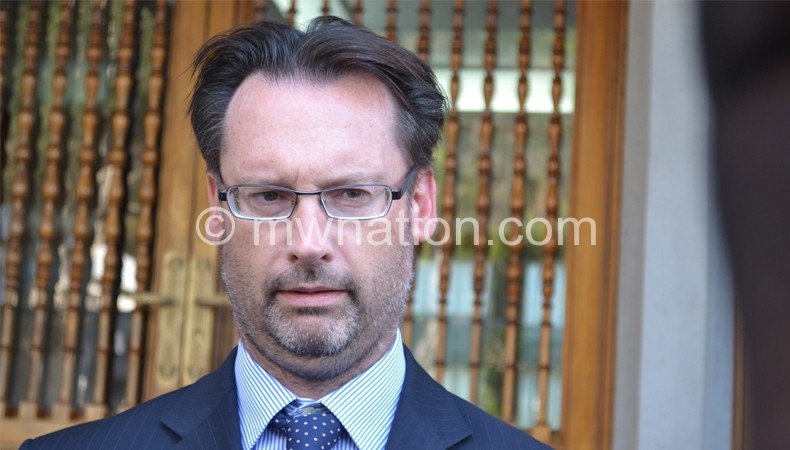APM begs for UK aid, says there won’t be Cashgate repeat

President Peter Mutharika yesterday went on a charm offensive to persuade Malawi’s leading development partner, Britain, to resume budgetary support.
Mutharika told the British High Commissioner, Michael Nevin, during a meeting at Sanjika Palace in Blantyre yesterday that he feels his administration has made a lot of progress to address concerns that led to the suspension of aid in the first place.
But Nevin is said to have argued that it cannot grant the President’s request because Lilongwe has not given London strong enough reasons to resume aid by way of sealing holes in the Public Finance Management (PFM) system.
In the closed door meeting, Mutharika also felt donors were shifting goal posts, arguing that the parameters under which the budgetary support would have resumed have been satisfied.
Of much concern to Mutharika is that some of the withheld budgetary support would have been used to support the very institutional reforms that the donors themselves are demanding.
However, Britain remains adamant that the resumption of direct budgetary support would only begin after a satisfactory review of the progress that the Malawi government has made in instituting reforms that will deter re-occurrence of Cashgate.

Instead, Nevin said the British government will provide about $100 million (around K42 billion), which will be channelled through non-government systems to continue supporting Malawi’s social and development sectors, among them, education and health.
Briefing reporters after the two-hour meeting, Foreign Affairs Minister George Chaponda said Mutharika told Nevin that his administration had met almost all the benchmarks that the donors had set and thus he does not see why there must not be a change of heart among development partners.
The benchmarks, according to Chaponda, include conducting public sector and public finance management reforms, pursuing Cashgate suspects, guaranteeing the independence of the criminal justice system, changes of leadership of some oversight and accountability institutions and providing more resources to them.
“The President made the point quite clearly [during the meeting] that while he shares the concerns the donors raised, he is concerned that his government is being denied the very resources that could have been used to complete the process of addressing the concerns in question,” said Chaponda.
“What is happening is like asking us to cover the distance, but denying us the legs. How then are we going to cover the distance?” he added. “So the message the High Commissioner has been asked to convey to his government is that this government can be trusted, we need the help and Cashgate will not happen again.”
Taking his turn to talk to the media, Nevin said at the moment Britain will encourage the Government of Malawi to complete the distance of the reforms to provide the assurance that public funds and British taxpayers’ money will not be abused again.
“So far, we are pleased with the public service reforms that the President has initiated. We are also happy with the work that the Minister of Finance is doing to clean up the public finance management systems. We wish to see this work completed,” said Nevin.
As Malawi awaits the review of these reforms at a date that was not named, Nevin said his government will continue to support the people of Malawi and that is the reason it would provide about $100 million through non-direct budgetary channels.
But throwing a hint that the wait might be long in having the budgetary support back, he said his government was pleased with the zero-aid budget because it recognises the importance of utilising locally generated resources before asking for support.
“We are prepared to help Malawi to emerge from aid dependency to self-sustenance,” said Nevin.
Chaponda pointed out that while it is already the policy of Mutharika’s administration to graduate from foreign alms, the weaning process will need to be gradual and supported by some amounts of aid.
During a debate in the British parliamentary upper chamber, the House of Lords, on October 23 2014, Jack Wilson McConnell, the former First Minister of Scotland, is reported to have observed that Malawi’s future needs to move beyond a heavy reliance on aid.
“Malawi must stimulate the creation of growth, markets, jobs and incomes for all its citizens, as the noble Lord pointed out,” reads McConnell’s contribution as recorded in the Hansard of that day, which we obtained on www.parliament.uk.
The Hansard quotes the Scottish politician, who is Baron McConnell of Glenscorrodaleas, saying the new government (in Malawi) “now has an opportunity to address the issues, which have long held Malawi back from the most sustained growth and progress.”
“They have an opportunity to set a strong vision for poverty reduction and to implement essential reforms to public financial management and the civil service, necessary to restore the confidence of the Malawian people and investors,” the Hansard quotes MacConell as saying.






Nothing wrong with what the Brits are insisting. Let the reforms be thoroughly completed so that indeed a repeat of abuse of public funds wont occur again.
Great discussion an great position of the UK. Cashgate has to be sorted out no matter how long it takes, before any direct budget support can be considered. for now the aid should only be for the institutional capacitation by seconding judicial officers, financial and forensic auditors, criminal investigation, police training and teacher training to inculcate more civil behaviour and conduct.
It’s good to know that the British Gov is holding strong and giving in to Mutharika. Let’s not forget that the architect of Cashgate is none other than the DPP.